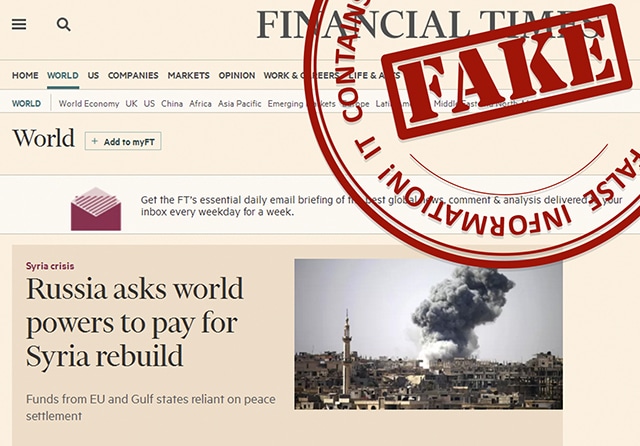
A rumour has been going round on social media lately concerning the rape of a teenager near the place in Lithuania where 1,000 or so NATO troops under German command are stationed. The fake news item –which the allies and the Lithuanian government once again attribute to a Russia unhappy with such deployments– failed to catch on this time. Another similar rumour a year ago, equally unfounded, about a girl of Russian origin who had supposedly been raped by immigrants in Germany had more success. What we are witnessing is information warfare. It is somewhat distinct from the cyberdefence and cyberattacks that many countries and organisations (including NATO) are engaged in, which are also on the rise.
In January the Russian Defence Minister, Sergey Shoigu, revealed the existence of ‘information operations forces’, comprising, according to other sources, 1,000 information troops in charge of what was previously known as Agitation and Propaganda (Agitprop). Shoigu claimed that these forces would be ‘much more efficient and powerful than they had been before, during the Soviet era’. In February the Russian Foreign Affairs Ministry unveiled a section on its website devoted to fake news, featuring articles from The New York Times, the Financial Times and other outlets, which could ask for the articles concerned to be taken down, according to the spokesperson, Maria Zakharova. ‘How can you accuse us of disseminating untrue information by government agencies and the media while you are doing the same against Russia?’, she asked. A report in The New York Times argued that ‘borrowing a practice from President Trump, Russia appears to be labelling as fake any article it dislikes’. Trump of course does the same with a section of the media in his country: ‘the enemy of the American people’. The Russian Ministry does not scrutinise Russian media, only foreign outlets. Meanwhile, some European media have started to have their own sections devoted to spotlighting news items they detect as false. In other words, this is a war in which not only governments but also sections of civil society play a role. But in Germany it is the government that is drafting a law that would place the onus on social media to withdraw any news items they may carry that incite hatred or are manifestly false. It could set the standard.
None of this is new. History is replete with fake news stories used for political or geopolitical ends. Augustus used them against Mark Antony. The US exploited them against Spain in order to launch the Spanish-American War in 1898. And the Nazis took them to extreme lengths. Winston Churchill is on record as saying ‘in wartime, truth is so precious that she should always be attended by a bodyguard of lies’. But we are not at war, not even a cold one –that is something else– and the scope of misinformation is much greater due to the ability to reach whole communities via the social media and the Internet. There is a major promoter underlying all this. Vladimir Putin, a former KGB officer, announced his intention in 2013 to ‘break the Anglo-Saxon monopoly on the global information streams’. The Chairman of the NATO Military Committee, the Czech General Petr Pavel, has warned that more fake news emanating from Russia is to be expected, of the sort mentioned at the outset.
The ‘information operations’ idea Shoigu referred to was already present in a Russian military doctrine published in 2014, and even earlier. As Deborah Yarsike Ball points out in a study for the NATO Defence College, the Chief of the Russian General Staff, General Valery Gerasimov, emphasised in 2013 the ‘role of non-military means of achieving political and strategic goals [which] has grown, and in some cases, they have exceeded the use of force in their effectiveness’. It is also worth mentioning in this context the ‘patriotic education’ for the ‘youth army’ of seven-to-16 year-olds, set up last year by the Russian Ministry of Defence.
Now everyone is engaged in these information wars. The latest Wikileaks revelations also hint at them in the case of the US. But the means of escalation in such wars remain to be seen. Europe is fearful of the impact that fake news could have on the forthcoming French and German elections, as well as the possible effects of cyberattacks; in the wake of electronic counting being abandoned in the Netherlands, these have led France to suspend online voting for the upcoming legislative elections amid concerns about hackers.
The EU, as part of a plan it has launched on communication strategy, has instigated a far more modest operation to counteract false Russian news disseminated through RT (formerly known as Russia Today, broadcast in various languages) and the sputniknews.com agency. The EU has set up the East Stratcom task force, lacking a budget of its own, as part of the European External Action Service (EEAS); its job is to analyse fake news emanating from Russian media, attempting to do so in virtually real time as far as items on Twitter and Facebook are concerned, as well as by means of a Disinformation Review. It has a network of helpers numbering several hundred, but a core made up of only a dozen people. There is a degree of imbalance in its capabilities, hence the fact that they are seeking the help of member states.
It is not only the Kremlin that has created what Yarsike Ball refers to as ‘a world of spin in which the truth is negotiable’. All the more so given the fact that it is neither overly expensive nor difficult, and it can be done surreptitiously and anonymously.


